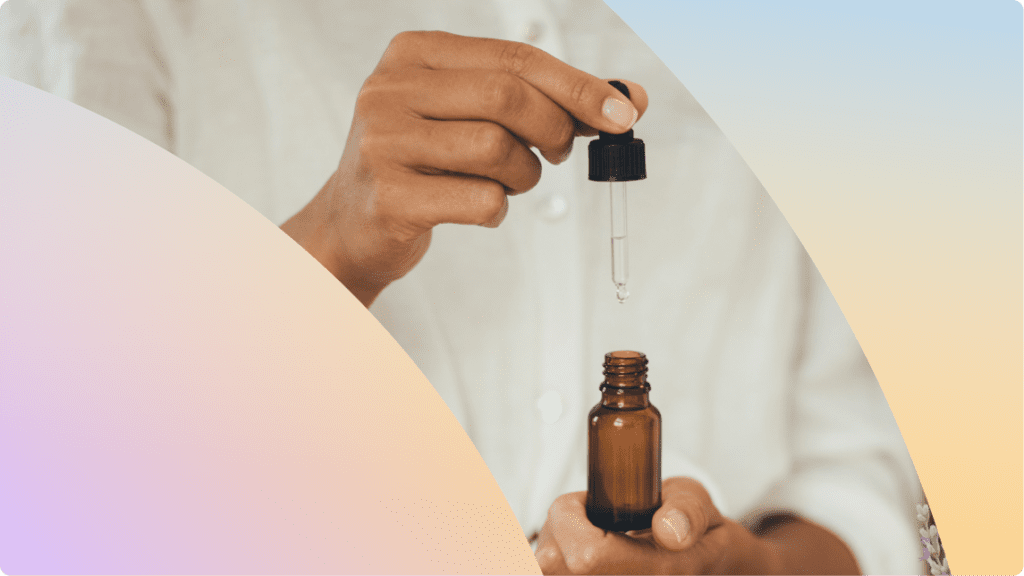Essential oils—or concentrated plant extracts—can be used in aromatherapy (aka using smell to improve your well-being) or applied topically to the skin. Proponents of essential oils say they can be a cure-all for everything from anxiety and stress to insomnia and infections, but in most cases, the jury is still out on whether there’s real science to back the claims. So what about obsessive-compulsive disorder (OCD)—can essential oils really help treat the condition? Let’s hear from the experts.
Can essential oils treat OCD?
“No, essential oils cannot solely be used to treat OCD,” says therapist and NOCD’s Chief Clinical Officer Dr. Patrick McGrath. “Instead, essential oils can be used alongside the only evidence-based treatment for OCD known as exposure and response prevention (ERP) therapy.”
OCD is a chronic mental health condition in which uncontrollable obsessions lead to compulsive behaviors. When OCD becomes severe, it can be highly distressing and significantly reduce someone’s quality of life. As such, OCD requires treatment with ample clinical research backing its effectiveness—just as you’d want to approach any other chronic illness. Translation: You can’t meditate it away, exercise it away, or aromatherapy it away.
“If you like essential oils, that’s wonderful, but it is not a cure-all or the simpler path for treating OCD. There’s no way around it: Treatment for OCD takes work, and you’ve got to put in the work in order to get the results you want,” says McGrath.
How can I use essential oils if I have OCD?
It’s worth repeating that there is a lack of research indicating that essential oils have a direct effect on OCD. But if your OCD is leading to other ailments that affect your well-being—such as anxiety, insomnia, or other symptoms—incorporating certain essential oils into your routine may offer some benefits.
Keep in mind, evidence regarding the effectiveness of essential oils is inconsistent. Not only that, but essential oils aren’t regulated in the United States, which means there is no oversight to ensure their quality. As a result, the exact contents of each bottle, including the concentration and potential contaminants, remain unknown.
Always check with your doctor before using them, and to prevent any allergic reactions, always do a patch test before trying an essential oil (and follow guidelines for dosage and dilution).
Here are some of the most popular options that you may want to ask your healthcare provider about:
Frankincense (Boswellia serrata)
Some research indicates frankincense oil may be helpful for stress management. For instance, a 2022 study found that the extract may aid in alleviating anxiety by binding to GABA receptors, which play a crucial role in regulating brain activity and modulating anxiety levels. Another 2019 study (albeit on mice) found that frankincense decreased levels of corticosterone, a stress hormone.
Rosemary (Rosmarinus officinalis)
A 2020 study found that the inhalation of rosemary decreased stress by reducing corticosterone levels while increasing brain dopamine levels.
Ylang Ylang (Cananga odorata)
One small study found ylang ylang to have benefits in terms of reducing anxiety when it was either applied to skin or inhaled.
Lavender (Lavandula angustifolia)
Research suggests the best use of lavender for anxiety-related symptoms is through oral supplements containing lavender essential oil. Lavender oil interacts with gamma-aminobutyric acid (GABA) receptors, which contributes to its calming effects.
Lemon Balm (Melissa officinalis)
Lemon balm is considered a traditional medicine for nervousness, anxiety, and insomnia. Some studies also indicate that the extract can also help in the treatment of depressive symptoms.
So what is the best way to treat OCD?
It’s understandable to want a natural remedy for OCD—something that addresses your symptoms without the side effects of a pharmaceutical drug. But keep in mind, the vast majority of people who are leaving in recovery from their OCD don’t need medication. Once they get access to the right kind of therapy, their symptoms drastically improve. Besides, “what is more natural than ERP?,” McGrath points out.
Knowing that, you’re probably curious to know: What exactly is ERP, and how does it work?
ERP is a specialized form of behavioral therapy for OCD that has been studied for decades. Treatment is done in partnership with a trained therapist who is skilled at helping people confront their triggers and intrusive thoughts while teaching them to resist the urge to respond with compulsions.
For example, if someone has a fear of contamination that leads them to compulsively wash their hands because of the distress and anxiety their thoughts create, a therapist may gradually expose them to situations where they come into contact with perceived contaminants. This is called an “exposure,” and it might start with something relatively mild, like touching a doorknob in their own home—and sitting with the discomfort of not washing their hands immediately afterward. Over time, this approach builds the ability to tolerate discomfort and anxiety and breaks the cycle of OCD.
“When you don’t face the things you’re afraid of and learn how to handle them, they overwhelm you for the rest of your life. That’s where ERP comes in,” McGrath says. “It helps you to challenge ideas that OCD throws in your head, which are not actually true. What I tell people is ‘don’t wait around to find something that helps when there’s already something out there proven to help.’”
The bottom line
While essential oils may help reduce anxiety and promote relaxation, essential oils cannot treat OCD on their own. Instead, they are best seen as a complementary approach. That said, if you’d like to incorporate essential oils into your treatment plan, consult with a mental health professional trained to treat OCD. They can help you develop a strategy that addresses your specific needs.

